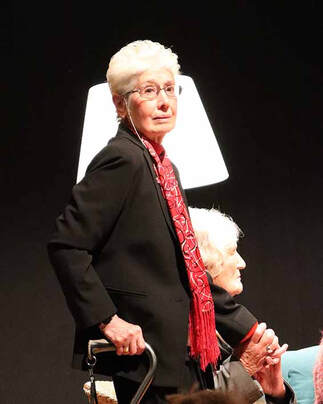 Phyllis Papps, pictured at the launch of the Bass Coast Prize for Non-Fiction, wants to encourage and support writers of non-fiction. Photo: Geoff Ellis
Phyllis Papps, pictured at the launch of the Bass Coast Prize for Non-Fiction, wants to encourage and support writers of non-fiction. Photo: Geoff Ellis By Catherine Watson
BASS Coast has been placed on the literary map with the launch of one of the richest competitions for non-fiction in Australia.
The Bass Coast Prize for Non-Fiction was launched by author Tom Keneally at the Phillip Island Literary Festival last weekend. He praised the generosity of the prize sponsor Phyllis Papps, a Phillip Island writer and activist who has written, compiled or edited some 20 books.
It’s one of the richest competitions for non-fiction in Australia with a total of $10,000 in prize money. The first prize winner will receive $5000, second $3000 and third $2000.
The prize is open to anyone living, working or attending an educational institution in Gippsland.
BASS Coast has been placed on the literary map with the launch of one of the richest competitions for non-fiction in Australia.
The Bass Coast Prize for Non-Fiction was launched by author Tom Keneally at the Phillip Island Literary Festival last weekend. He praised the generosity of the prize sponsor Phyllis Papps, a Phillip Island writer and activist who has written, compiled or edited some 20 books.
It’s one of the richest competitions for non-fiction in Australia with a total of $10,000 in prize money. The first prize winner will receive $5000, second $3000 and third $2000.
The prize is open to anyone living, working or attending an educational institution in Gippsland.
The prize is auspiced by the Bass Coast Post, and I’m delighted to join Ms Papps on the judging panel, along with Geoff Ellis, editor of the Waterline News.
While there are many short story competitions in Australia, prizes for short non-fiction are much rarer.
Ms Papps said she wanted to encourage and support writers of non-fiction in an era of diminishing options for mainstream publication.
“I particularly want to support writers in rural/country areas because they don't have the opportunities and networks that writers in urban areas have.”
Just as importantly as the money, the prize gives Gippsland writers a deadline and a guarantee that their work will be read.
Entries can be in the form of an essay, profile, memoir, long-form journalism or a substantial portion of a book manuscript but must pertain to the Gippsland region, issues or people. The length is 5000-10,000 words.
The three judges are looking forward to a deluge of entries by the closing date of November 29, 2019. Prize winners will be announced in February 2020.
The winning entries will be published in the Bass Coast Post and may be republished as an e-book or hard copy following consultation with the writers.
For more information and entry criteria, visit Bass Coast Prize for Non Fiction at basscoastprizefornonfiction.weebly.com/ or email Phyllis Papps at [email protected].
Catherine Watson is editor of the Bass Coast Post and one of the judges of the first Bass Coast Prize for Non-Fiction.
While there are many short story competitions in Australia, prizes for short non-fiction are much rarer.
Ms Papps said she wanted to encourage and support writers of non-fiction in an era of diminishing options for mainstream publication.
“I particularly want to support writers in rural/country areas because they don't have the opportunities and networks that writers in urban areas have.”
Just as importantly as the money, the prize gives Gippsland writers a deadline and a guarantee that their work will be read.
Entries can be in the form of an essay, profile, memoir, long-form journalism or a substantial portion of a book manuscript but must pertain to the Gippsland region, issues or people. The length is 5000-10,000 words.
The three judges are looking forward to a deluge of entries by the closing date of November 29, 2019. Prize winners will be announced in February 2020.
The winning entries will be published in the Bass Coast Post and may be republished as an e-book or hard copy following consultation with the writers.
For more information and entry criteria, visit Bass Coast Prize for Non Fiction at basscoastprizefornonfiction.weebly.com/ or email Phyllis Papps at [email protected].
Catherine Watson is editor of the Bass Coast Post and one of the judges of the first Bass Coast Prize for Non-Fiction.